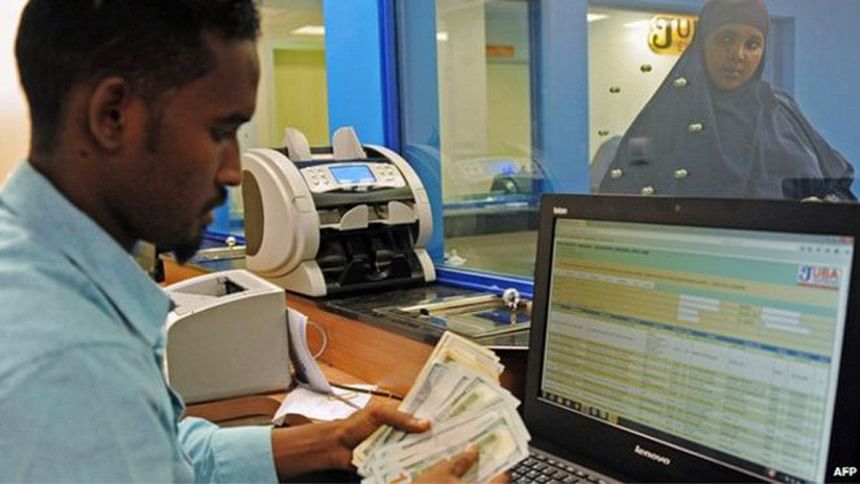Remittance Inflow: Eid may tick it up this month

Two years ago, Bazlur Rashid of Bogura went to Saudi Arabia to work as a farm labourer. He now sends Tk 15,000 to Tk 20,000 in remittance every month.
His wife Mahbuba Begum said although her husband could not send her the money in March due to lockdown in Saudi Arabia among other reasons, she received Tk 20,000 in April. The family back home in Bangladesh totally depends on Bazlur's income.
Shahadat Hossain of Madaripur lives in Dubai. There, he runs a small business employing a few other Bangladeshis.
He said he remitted Tk 14 lakh in March and Tk 9 lakh in April to his family and other relatives, taking the ongoing coronavirus crisis into consideration.
Shahadat sent the money from his savings. Since the business is now closed due to the pandemic, he does not know how much he will be able to remit in future. He also claimed that more than half of the Bangladeshis in Dubai have no job right know. The future seems bleak.
Like Bazlur and Shahadat, more than one crore Bangladeshis are currently working in other countries. Around 75 percent of them are in the Middle East.
Remittance from expatriates is one of the main pillars of the Bangladesh economy. Last year, the expatriates sent $18.3 billion of their earnings in remittance through the banking channel.
But this time, the Covid-19 pandemic has thrown them in uncertainty as economies remain under severe strain.
Many saw their wages were cut, while many lost job opportunities. Many countries went into lockdown and houses for facilitating remittance went shut.
Left with no job, many had to return home.
Yet, the expatriates did not completely stop sending remittance. They are doing their best, even borrowing, so that the remittance inflow does not stop.
In fact, the flow is likely to rise ahead of Eid-ul-Fitr.
In total, expatriates sent $606 crore or Tk 51,510 crore between January and May 12 this year, said Bangladesh Bank sources.
BB sources also said from July last year to April this year, expatriates sent $1,485.60 crore in remittance. However, following the coronavirus outbreak in December, the remittance flow started to decline from January.
In January, $163 crore was remitted while in February the remittance inflow was $145 crore, said BB sources.
As widespread lockdowns were imposed due to the pandemic, the remitted money in March this year stood at $128 crore, a 12 percent decline from what was remitted in March last year.
In April this, expatriates remitted $108.10 crore.
As Eid is nearing, the remittance flow, however, has risen in May.
In the first two weeks of May alone, $62.4 crore was received in remittance, said Sirajul Islam, spokesperson for the central bank.
Of the state-owned banks, the highest amount of remittance is received by Agrani Bank.
Asked about the latest situation, Agrani Bank Managing Director Mohammad Shamsul Islam said in March last year, $133 million in remittance was received by the bank.
In March this year, the amount, however, increased to $156 million, he said.
But remittance flow declined in April this year compared to what was received in April last year, he added.
Whereas $141 million was remitted through the bank in April last year, the amount stood at $90 million this April, he added.
"There is no doubt that the drop in remittance flow is linked to the coronavirus pandemic," he said, adding that many houses used for sending remittance were now closed in different countries.
He said they have launched an app to make remitting money easier for the expatriates. Now, expatriate Bangladeshis in Singapore can use the app to send money home.
He hoped that the remittance flow will increase as Eid is nearing.
Bangladesh earns the highest remittance from Saudi Arabia. The Gulf country hosts about 15 to 20 lakh Bangladeshis. In the last fiscal year, more than $3 billion was earned in remittance from Saudi Arabia alone.
However, many Bangladeshis there are now passing days in hardship.
Electrical mechanic Mohammad Ali of Natore has been running a small shop in Saudi Arabia for the last two decades. Five Bangladeshis work at the shop.
They said they were having limited work opportunities since the coronavirus crisis emerged.
They added that although some were still able to send money home from their savings or by borrowing, others were not that fortunate.
Another reason why the remittance flow has declined is that many of the houses for facilitating remittance by expatriates are now closed.
Selim Shahriar of Chattogram's Anwara works in a ship owned by a Japanese company.
He said he sent money from Singapore via his company.
Asked about the amount he remits, he said he has parents, wife, and two children back home.
They can meet their expenses for two to three months if $1,000 is sent, Selim said, adding that he, however, sent an additional amount due to the crisis and Eid. Also, one of his family members is sick.
The top 15 countries, from where Bangladesh earns remittance, are Saudi Arabia, the UAE, the United States, Kuwait, the United Kingdom, Malaysia, Oman, Qatar, Italy, Bahrain, Singapore, South Africa, France, South Korea, and Jordan.
In terms of earning remittance, Bangladesh is among the top 10 countries.
Meanwhile, as the remittance flow continued, the central bank's foreign exchange reserves has increased to $3,311 crore, despite that the fact that the pandemic caused the income of the expatriates to go down, if not stop.
World Bank projected the global remittance flow will see a 20 percent decline this year due to the coronavirus pandemic. Bangladesh will see a 22 percent drop in its remittance earnings.
Already, the downturn has started to become visible.
Zahid Hossain, lead economist of World Bank Bangladesh, said the countries from where Bangladeshi expatriates send remittance were still experiencing lockdown situation.
He said many expatriates got infected with coronavirus. Besides, many others have been left without work opportunities while many of them have returned home.
He said remittance earnings, however, may increase this month due to Eid-ul-Fitr.
"However, the overall remittance earning this year will decline," he added.
Asked how the crisis could be tackled, Zahid said, "Diplomatic efforts can be taken so that expatriates don't have to return home after losing jobs. The countries where expatriate Bangladeshis are living have to be convinced that they will need foreign workers in future.
Apart from six state-owned and two specialised banks, 40 private banks, their branch offices across the country, agent banking, mobile financial service (MFS) providers and different other private organisations reach expatriates' hard-earned money to their family members.
Special incentive has been rewarded since July 1 last year to increase remittance flow through the authorised channel.
Now, expatriates receive Tk 2 as incentive for remitting Tk 100. As a result, remittance flow has been on the rise since July.
Recently, the Bangladesh government has announced giving 2 percent cash support without scrutiny for sending $5,000 or Tk 5,00,000 to overcome the downturn in remittance flow caused by the pandemic.
Earlier, the government provided such cash support against up to Tk 1,50,000.
On May 12, Bangladesh Bank issued a gazette in this regard.
Ahmed Munirus Saleheen, secretary at expatriates' welfare and overseas employment ministry, said migrant workers are a lifeline for Bangladesh's economy.
He said they send their hard-earned money. They stand by the country both in good and bad days.
He said the expatriates were continuing to remit money despite facing various obstacles and that the government wanted to stand by them in this time so difficult.
"For this, we have created a Tk 200 crore fund from which they can get soft loan," he added.
Saleheen said Prime Minister Sheikh Hasina also announced a further Tk 500 crore support, which would be disbursed through Expatriates' Welfare Bank.
He urged all expatriate Bangladeshis currently living abroad to have patience. "Good days will come once the crisis is over."
[The writer is head of migration programme at Brac and a freelance journalist]

 For all latest news, follow The Daily Star's Google News channel.
For all latest news, follow The Daily Star's Google News channel. 



Comments